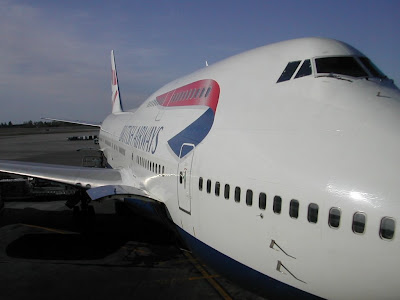 Photo credit: 2747.com
Photo credit: 2747.comI was reading an op-ed piece in the New York Times yesterday written by the US Secretary of Transportation, Mary E. Peters, which highlighted her attempts to change the way landing slots are allocated at the busiest airports in the US - the three in the New York area (JFK, La Guardia and Newark).
It also outlined the rationale for landing slot auctions - that demand should determine the price (cost) of acquiring a slot. The most lucrative departure/arrival slots would have a premium over those less popular slots, in contrast to the current allocation mechanism which sees a flat charge applied irrespective of demand (based on aircraft weight, instead).
She writes:
After all, the airlines themselves lower ticket prices to attract passengers when demand is low and then raise prices to maximize revenues when demand is high. What would happen if airlines were required by the government to charge the same ticket price for travel on Dec. 24 as they charge in the middle of September? There would either be rationing of extremely scarce seats on Dec. 24 or exorbitantly high prices for widely available seats in the middle of September. In either case, this inefficient outcome would damage the economy broadly and the aviation sector specifically.I was surprised to learn that landing slots were not already allocated by auction in the US. Further investigation revealed that a similar flat pricing structure is used at BAA's airports as well, determined by the Civil Aviation Authority - the industry regulator, with landing slots allocated by ACL.Yet that is exactly how airports charge airlines for the use of their terminals and runways.
Price caps are a ludicrous way to manage increasing air travel demand. Passengers and airlines alike should face the full cost of their use of airport services - after all, there exist opportunity costs of allocating scare resources.
The main benefit of auctioning landing slots is that market forces will dictate demand for slots, with prices dictated by the value of the slots to bidders.
There could be many benefits to this, which could address many of the concerns of groups such as Plane Stupid. Auctions are likely to moderate demand for slots, which could ease the need for airport expansion. Furthermore, existing slots are likely to yield greater revenue - thereby providing much needed funds for further capital investment in existing infrastructure, which could ease the need for airport expansion.
At the same time, auctions would allow the removal of 'use-it-or-lose-it' conditions, as the impact of this could be factored into pricing decisions by airlines at the point of auction. This would mean they wouldn't have to fly ghost flights in order to maintain slots.
Gluing yourself to the Prime Minister is a decent stunt. But environmental lobbyists miss the point - it is price caps, not airport expansion per se, that are plane stupid.
- Rising oil prices are already putting strains on airline business models. Increasing input costs could naturally moderate demand assuming the mechanisms to consumer fares work appropriately. Nonetheless, auctions, not price caps, are a better way of regulating use of the UK's airport services.
No response to “Plane Stupid”
Post a Comment